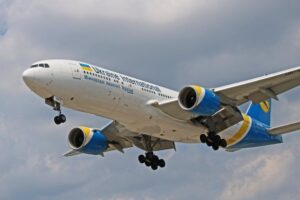
Ukraine International Airlines (UIA, Kyiv) has reached an agreement on wet-leasing of medium-haul Boeing 737-900 aircraft to the Latvian carrier airBaltic, the Ukrainian carrier said.
From May 1, the aircraft and crews of the Ukrainian airline will begin to be based at Riga Airport to serve the partner flight network, UIA said in a statement on Monday.
At the same time, it is specified that the UIA aircraft will provide connection to a number of European airBaltic destinations. In particular, the plane is booked for flights to Berlin, Madrid, Brussels, Oslo, Copenhagen and other destinations.
According to the press release, four crews of the Ukrainian carrier (28 people in total) will be involved in the operational work of the UIA aircraft on the partners’ routes. The aircraft will operate flights with the UIA corporate color and livery preserved, as well as the crews will work in the original uniform of the Ukrainian airline.
According to the terms of the contract, a service representative of the Latvian carrier will be present on each UIA flight on airBaltic routes.
“We are sincerely glad that our European partners are helping both the Ukrainian state and businesses with a clear, absolutely transparent support for Ukraine. This is especially true amid recent UIA compliance decision not to wet-lease its aircraft to operators who continue flying to Russia. Let this narrow down the scope of opportunities, but it is fully consistent with our morals,” UIA CEO Yevhen Dykhne is quoted in the message.
The deadline for operation of the UIA aircraft in the airBaltic fleet is currently being specified by partners.
Maintenance of Boeing 737-900 as part of the airBaltic fleet will be carried out by UIA foreign contractors.
The Ukrainian airline, as a long-term IOSA certified operator, will ensure operation in accordance with all international operational safety standards.

A study conducted by the CREA center shows that after the start of the war, the EU countries remain the largest consumers of Russian energy resources, according to the British edition of the Financial Times.
Thus, Germany imported hydrocarbons from the Russian Federation for more than 9 billion euros in two months, and Italy – almost 7 billion euros.
This is mainly natural gas supplied through pipelines. At the same time, China, which occupies the third position, buys mainly oil.
In addition, the Netherlands and France, as well as Turkey, remain major buyers of Russian energy resources.
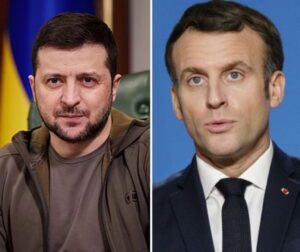
French President Emmanuel Macron, during a telephone conversation on Saturday with Ukrainian President Volodymyr Zelensky, promised to intensify the provision of military and humanitarian assistance to Kyiv, BFMTV channel said, citing sources.
According to the channel, Macron “promised to increase support for Ukraine by transferring weapons and humanitarian aid.”
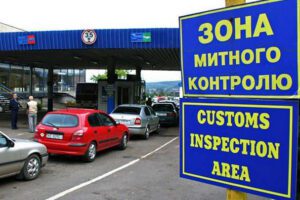
The number of people who entered Ukraine through its western border on April 30 rose from over 35,000 a day earlier to almost 40,000, the highest since the start of the war, the State Border Service reported on Facebook on Sunday.
According to its data, on the last day of April, a record number of vehicles passing through the border since the beginning of the war was also recorded – 19 thousand, which may be due to the expectations of closing the window for preferential import of cars into Ukraine in connection with the relevant law submitted to the Verkhovna Rada .
The exit flow on April 30 remained at the level of the previous day – 38 thousand, being less than the entry flow for the first time since April 24, the State Border Service indicated.
The agency clarified that over the past day, the number of registered vehicles with humanitarian cargo increased to 380 from 250 the day before.
The State Border Service recalled that, according to the Slovak side, from May 2, the Velke Slementse checkpoint (on the Ukrainian side – Malye Selmentsy) will operate from 09:00 to 21:00 (Kyiv time).
According to the data of the Polish border service on Twitter, on April 30, 26.8 thousand entered Ukraine from the country against 23.6 thousand the day before. In the opposite direction, the flow amounted to 23.5 thousand compared to 21.8 thousand a day earlier.
In total, since the beginning of the war, the Polish border agency points out, 3.076 million people entered the country from Ukraine, and 975 thousand people in the opposite direction.
According to UNHCR data, as of 13:00 on April 29, a total of 5.469 million people left Ukraine since the beginning of the war (excluding entry flow), of which 3.014 million went to Poland, 881.19 thousand to Romania and Moldova, and 656 to Russia 38 thousand, Hungary – 519.98 thousand, Slovakia – 371.92 thousand, Belarus – 25 thousand.
At the same time, according to the State Border Service, 1.29 million people have entered Ukraine by this date since February 28.
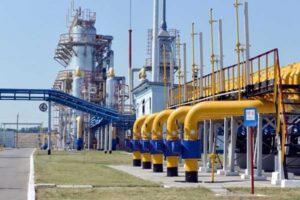
The nomination for pumping Russian gas to Europe as of May 1 is 96.7 million cubic meters. m compared to 69.6 million cubic meters. m on April 30, according to the data of the “GTS Operator of Ukraine”.
Gazprom (MOEX: GAZP) supplies Russian gas for transit through the territory of Ukraine in the regular mode, in accordance with the confirmed applications of European consumers – 97.2 million cubic meters. m on May 1,” the official representative of the company Sergey Kupriyanov told reporters.
European importers of Russian gas have significantly increased their bids for the supply of Gazprom’s fuel, waiting for contract prices to fall. Most of the contracts are linked to the day-ahead market index – its value in April was at a record level of about $1,400 per thousand cubic meters, and in May dropped to $1,100.
In April, as before in January of this year, buyers minimized gas withdrawals under contracts with external suppliers, trying to find a cheaper alternative on the spot market. Contract prices approaching spot prices automatically increased import bids.
The situation with the production of electricity from renewable sources in Europe has deteriorated markedly this week. Last week (from 18 to 24 April) wind turbines provided an average of 17% of electricity generation in the EU, but for the six days of this week, their contribution is only 8.8%, according to data from the WindEurope association. For ten days ahead, Europe is expected to have low wind or calm weather, which does not give a chance to correct the situation.
Europe continues pumping gas into underground storage facilities. At the moment, the reserves are 33%, growth over the past day – 0.26 percentage points, according to data from the association Gas Infrastructure Europe. The current level of stocks in UGS facilities in Europe lags behind the five-year average by 6 percentage points. In April, injection was held back by high prices for imported gas.
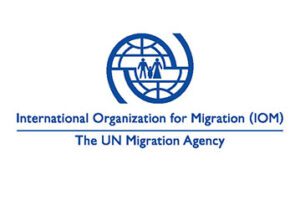
The International Organization for Migration (IOM) on Friday requested $514 million to support its continued response to the humanitarian needs of war-affected people in Ukraine and neighboring countries.
According to the IOM, since the beginning of the war, more than 7.7 million people have become internally displaced persons (IDPs) in Ukraine and more than 5 million refugees, as well as at least 233,000 third-country nationals have asked for asylum in other countries.
“Humanitarian needs in the region continue to grow, with the affected population in need of critical support… The IOM emergency appeal aims to reach more than 10 million people: 8 million in Ukraine and 2 million people who have fled the country. assistance includes IDPs, refugees, third-country nationals and vulnerable groups, including women, children, the elderly and people with disabilities.
The organization intends to continue to provide support to national and local governments, as well as non-governmental organizations and civil society representatives in various sectors. It is planned to expand the organization of shelters, accommodation centers, reception and transit points. IOM also provides temporary shelter and non-food items to those in need.
“Faced with growing health needs, IOM will continue to improve access to healthcare… In addition, IOM is working to improve water supply, sanitation and hygiene infrastructure… The supply chain established by the Organization in the region will continue to facilitate the delivery of humanitarian assistance to people in hard-to-reach areas,” – the message says.